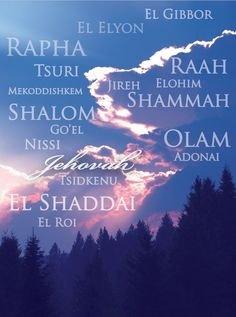BIBLE DOCTRINE SURVEY - NAMES OF GOD Nr. 3

I pray that the Holy Spirit will reveal all that we are going to do in this studies.
1 Cor 2: 10 But God has revealed them to us through His Spirit. For the Spirit searches all things, yes, the deep things of God.
If you want to know God to His full extent then I am inviting you to do this studies with me. Today we start with a new series about the Names of God whereby He reveals to us who He is through His names in the bible. This is a series of studies not to be missed!
I am including a comment that @warudo made on one of the studies that is very precious and that is:
It is so important to remember that in our study of God there are two important things that we should seek to know. First, we need information, revealed facts about God. We need knowledge of who God is, how He exists, or about what God is like. But second, we desperately need to go beyond just the facts about God. We need to know God personally and intimately. The facts are the foundation, but the goal is fellowship with God as we learn about His person, plan, purposes, principles, and promises.
NAMES OF GOD
The names or titles given to God in scripture reveal much about His characteristics - who He is, what He is like and what He does. When the Bible uses the phrase the "name of God" or "in the name of the Lord" it refers to His total person - All that He is. And God's name is excellent and majestic.
Psalm 8:1 O Lord, our Lord,
How excellent is Your name in all the earth,
Who have set Your glory above the heavens!

Today we continue with:
THE MAIN OLD TESTAMENT YAHWEH/JEHOVAH COMPOUND NAMES
Jahweh Jireh means the "Lord provides" and was used by Abraham when God provided a sacrificial lamb instead of Isaac.
Genesis 22:14 So Abraham called that place The Lord Will Provide. And to this day it is said, “On the mountain of the Lord it will be provided.”
Yahweh Sabaoth means the "Lord of hosts" (hosts is sometimes translated Almighty or army) and pictures God as the commander of the heavenly armies.
Joshua 5:14 “Neither,” he replied, “but as commander of the army of the Lord I have now come.”
1 Samuel 1:3 Year after year this man went up from his town to worship and sacrifice to the Lord Almighty at Shiloh, where Hophni and Phinehas, the two sons of Eli, were priests of the Lord.
Who is he, this King of glory?
The Lord Almighty—
he is the King of glory.
Yahweh Rophe (or Rapha) means the "Lord who heals" and denotes the physical and spiritual healing power of God.
26 He said, “If you listen carefully to the Lord your God and do what is right in his eyes, if you pay attention to his commands and keep all his decrees, I will not bring on you any of the diseases I brought on the Egyptians, for I am the Lord, who heals you.”
Psalm 103:2-4 Praise the Lord, my soul,
and forget not all his benefits—
3 who forgives all your sins
and heals all your diseases,
Isaiah 61:1 The Spirit of the Sovereign Lord is on me,
because the Lord has anointed me
to proclaim good news to the poor.
He has sent me to bind up (rophe) the brokenhearted,
to proclaim freedom for the captives
and release from darkness for the prisoners,[a]
Yahweh Shalom means the "Lord is peace" and denotes the lack of tension, conflict and strive in God.
Judges 6:24 So Gideon built an altar to the Lord there and called it The Lord Is Peace. To this day it stands in Ophrah of the Abiezrites.
Yahweh Nissi means the "Lord is my banner" and signifies that the battle is the Lord's
Exodus 17:15 "Moses built an altar and called it The Lord is my Banner. 16 He said, “Because hands were lifted up against[c] the throne of the Lord,[d] the Lord will be at war against the Amalekites from generation to generation.”
Yahweh Tsidkenu means the "Lord our righteousness" and signifies God as the only source of true righteousness.
Jeremiah 23:6 In his days Judah will be saved
and Israel will live in safety.
This is the name by which he will be called:
The Lord Our Righteous Savior.
Yahweh Maccaddeschecem means the "Lord our sanctifier" (or the Lord who makes you holy) and signifies that God is the one who sets people apart and makes them holy.
Exodus 31:13 12 Then the Lord said to Moses, 13 “Say to the Israelites, ‘You must observe my Sabbaths. This will be a sign between me and you for the generations to come, so you may know that I am the Lord, who makes you holy.
Leviticus 20:8 8 Keep my decrees and follow them. I am the Lord, who makes you holy.
Yahweh Raah (rohi) means the "Lord our Shephard" and denotes God's loving care, protection and provision for His people.
Psalm 23:1 The Lord is my shepherd, I lack nothing.
Genesis 48:15 15 Then he blessed Joseph and said,
“May the God before whom my fathers
Abraham and Isaac walked faithfully,
the God who has been my shepherd
all my life to this day,
Note: Sometimes the compound name "Yahweh Elohim is used and means the LORD (Yahweh) who is God (Elohim).
Genesis 2:4 This is the account of the heavens and the earth when they were created, when the Lord God made the earth and the heavens.
I am including this comment of @lastdays as I think it is a very valuable contribution to this study:
[-]lastdays (31) · 4 days ago
יהוה Yod Hey Vav Heh
In modern Hebrew there is no “W” sound and the pronunciation of God's Holy Covenant name is Yehovah.
There is some evidence that in ancient Hebrew the Vav was pronounced as “Waw” and the "Tetragrammaton“ (meaning "the four letter word“) was pronounced Yahweh.
It is this form of God’s name, often referred to as the Ineffable Name, that is the most frequently used in the Bible. When you read the word LORD written in all capitals in an English translation of the Old Testament it represents Hebrew Covenant name of God. The primary reason for the use of LORD in place of God's Hebrew name is to follow the tradition of the Israelites in not pronouncing or spelling out God's name.
Orthodox Jews writing in English will omit the vowels when writing L-rd and G-d. Most often they will say, HaShem (the Name) instead of Yehovah because they stress the letter of the Law and do not want to take His name in vain.
ASSIGNMENT:
Try to memorise these precious names of God and let me know how it is going? Is it easy or difficult to remember? Which one of these names do you relate to the most? (Put your answers in the comments and you just might get a surprise :-)
I did this Bible School course more than 20 years ago over a period of 2 years, and it is now my privilege to share it with you.
Dr Dennis J. Mock: Bible training for church leadership, Bible Doctrine Survey, course no. 4
Scripture: https://www.biblegateway.com/passage - New King James Version

יהוה , To be, To create, The one who created, The one who is :)
Amen!
Amen to that @clausewitz!
יהוה צבאות The LORD of Hosts or Armies is pronounced Yehovah Tsahvayot in Hebrew. Sabaoth is the Greek form of the Hebrew word.
Thank you for your contribution @lastdays.

And THANK YOU for blessing the Christian community on Steemit with this awesome series!
I have learnt a lot from these, i never knew these. The names of God and their meaning are truly wonderful.
Thank you @seanmalex. I am so grateful that you are learning new things through this study. All glory, honor and praise to God!
Thank you ma.
Learn new names again, this one caught my attention a lot may be because of it length : Yahweh Maccaddeschecem, but before now had been relating with Yahweh Shalom, as peace with prosperity.
Thank you for commenting and I am very grateful to God that we can learn new things in this studies.
Hi @hope777, I'm really enjoying your Bible doctrine posts! I would have to say there are two names here that I relate to the most: Yaweh-Jireh (The-Lord-Will-Provide) and Yaweh-Raah (The-Lord-Our-Shepherd).
I wrote a post a few days ago detailing how I came to know God as Yaweh-Jireh through what I like to call my "$100(US) Story." The essence of that story is that at times in which I could give to help others, I chose to do so. Later, when I found myself in need, God gave back to me 100x more than I had given away. I learned that God loves a cheerful giver, you can't out-give God, and "for everyone who knows the good he should do and does not do it, sins." (James 4:17)
Throughout my life, Yaweh-Raah has been teaching me the role of a shepherd. In fact, my screen name, "poimen," is the Greek word for shepherd. My life experiences, jobs, and education can all be understood in the context of this one word. Therefore, I understand clearly that "Before I formed you in the womb I knew you, before you were born I set you apart; I appointed you as a prophet to the nations." (Jeremiah 1:5)
Dear @poimenpost thank you for your in-depth reply and valuable contribution. I still have to check that post out.
Lol, not even going to try the Hebrew, but I am familiar with the English names. My favorite is God of our righteousness be ause without that, the others are pretty meaningless. Thnx, Hope, and keep up the good work *-)
Dear @gpa1950 thank you for commenting. Yes, I agree if we did receive God's righteousness we are lost. What I noticed in this study the Lord our Sanctifier was already written about in Leviticus 20. I always associate righteousness and sanctify more with the New Testament but God was already all that in the Old Testament.
Names of God: His Titles Revealed in Scripture
"ELOHIM" (or Elohay) is the first name for God found in the Bible, and it's used throughout the Old Testament over 2,300 times. Elohim comes from the Hebrew root meaning "strength" or "power", and has the unusual characteristic of being plural in form. In Genesis 1:1, we read, "In the beginning Elohim created the heaven and the earth." Right from the start, this plural form for the name of God is used to describe the One God, a mystery that is uncovered throughout the rest of the Bible. Throughout scripture, Elohim is combined with other words to describe certain characteristics of God. Some examples: Elohay Kedem - God of the Beginning: (Deuteronomy 33:27). Elohay Mishpat - God Of Justice: (Isaiah 30:18). Elohay Selichot - God Of Forgiveness: (Nehemiah 9:17). Elohay Marom - God Of Heights: (Micah 6:6). Elohay Mikarov - God Who Is Near: (Jeremiah 23:23). Elohay Mauzi - God Of My Strength: (Psalm 43:2). Elohay Tehilati - God Of My Praise: (Psalm 109:1). Elohay Yishi - God Of My Salvation: (Psalm 18:46). Elohim Kedoshim - Holy God: (Leviticus 19:2, Joshua 24:19). Elohim Chaiyim - Living God: (Jeremiah 10:10). Elohay Elohim - God Of Gods: (Deuteronomy 10:17).
wow, thank you for this in-depth and valuable comment @ayohemi, you can make a post about this names. I don't know these that you mentioned. This is what I love of this Bible Study and all of you participating now we can all learn from each other! Blessings!
I started with No. 4 so I am working my way backwards to 1. Will have to check out lesson 5 when it comes! Thank you for this in-depth study on the Names of God! God bless!